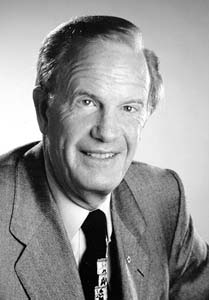
Year Born: 1933
Year Died: 2008
Year of Induction: 1998
Ted Rogers Jr., whose father invented the world’s first alternating-current tube, allowing radios to be operated by ordinary household current, and who had launched Toronto’s CFRB, started his own career in broadcasting with the purchase in 1960, of CHFI-FM. He quickly changed the station to a stereo operation and two years later added CFTR-AM, also in Toronto.
Graduating from Upper Canada College, the University of Toronto and Osgoode Hall, and then being “Called to the Bar”, Ted had already set his course in life. Communications was his field and he would use his legal training to reach his goals.
In 1960, he partnered with Joel Aldred to acquire a 20% stake in the consortium that was successful in being awarded the first private television station licence in Toronto. The station, CFTO-TV, began broadcasting in 1961.
During the early sixties, Ted determined that cable television had a strong future, and his company Rogers Cable Ltd. acquired Ontario cable licences for areas in and around Toronto, Brampton and Leamington. When the time came for these licences to be renewed in 1969, Rogers was required to divest itself of its shares in Baton Broadcasting, CFTO-TV’s parent company, while Baton had to sell its shares in Rogers Cable.
In 1979, Ted acquired control of Canadian Cablesystems Ltd., changing the name to Rogers Cable TV Limited. A year later, Rogers purchased Premier Communications Limited of Vancouver, almost doubling the size of Rogers Cable TV Ltd., making it the largest cable TV company in Canada.
Continuing his quest for new horizons, Ted Rogers became a founding shareholder of Cantel Inc., a national cellular telephone network which commenced operations in 1985.
Rogers Communications acquired and built several cable television systems in the United States. These systems were sold in March of 1989.
Also in 1989, after Maclean-Hunter had acquired Selkirk Communications Ltd., Rogers bought the Selkirk radio stations. In 1992, Moffat Communications sold its radio stations to Rogers. In 1994, Rogers purchased Maclean-Hunter, and Rogers Broadcasting took over the Maclean Hunter stations which gave Rogers Communications a major presence in Canadian telecommunications and publishing.
In 2002, the Rogers broadcasting group consisted of 43 AM & FM stations and a growing number of conventional TV stations and specialty channels.
Ted Rogers received many honorary degrees both in Canada and the United States. In 1990, he was appointed an Officer of the Order of Canada, and was invested in the Order on April 17th 1991.
The citation read:
“Known for his determination and as an advocate of new technology, he has taken risks in the fields of broadcasting and telecommunications which have put him at the forefront of many enterprises. He has also been a strong supporter of Junior Achievements of Canada, giving young people opportunities for hands-on business experience, and has made a significant contribution to the establishment of a communications centre at Ryerson Polytechnical Institute.”
In 1998, Ted Rogers was inducted into the CAB Broadcast Hall of Fame.
On December 2nd 2008, the Rogers family announced that Ted Rogers had died at home in the early hours of the morning at the age of 75, after having suffered from congestive heart failure for several months.
On October 5th 2010, Ted Rogers was posthumously inducted into the International Wireless History Foundation Hall of Fame. The induction took place at the gala dinner of the Wireless History Foundation at the Palace Hotel in San Francisco. Melinda M. Rogers, RCI’s Senior Vice President Strategy and Development, accepted the award on behalf of the family and company.
